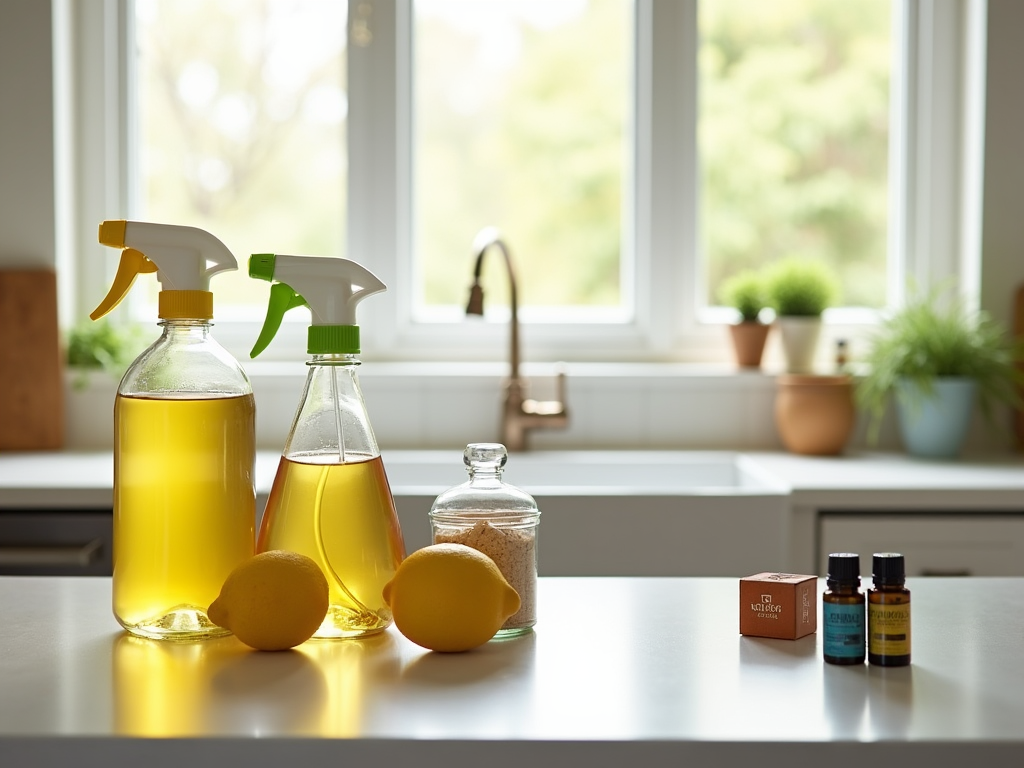When it comes to maintaining a clean and healthy living environment, natural cleaning supplies have become an essential choice for many households. This article explores six natural cleaning agents that not only ensure a sparkling home but also offer environmentally friendly alternatives to harsh chemicals. Transitioning to these natural solutions can help you avoid health risks while still effectively disinfecting your space.
Vinegar: The Multi-Purpose Champion

Vinegar has long been a cornerstone in the realm of natural cleaning supplies. This common household item is highly acidic, which makes it a powerful agent against bacteria, mold, and germs. It is especially effective for cleaning glass, countertops, and bathroom fixtures. To utilize vinegar, simply mix one part vinegar with one part water in a spray bottle for an all-purpose cleaner. Despite its strong odor, vinegar does not leave a lasting scent once it dries, making it a favorite for those sensitive to fragrances. Additionally, vinegar is biodegradable, ensuring your cleaning practices are gentle on the planet.
Baking soda isn’t just for baking; its mild abrasive nature makes it an excellent scrubbing agent and odor neutralizer. Use it to tackle tough stains in sinks, ovens, and even on pots and pans. By creating a paste with water, baking soda can offer a non-toxic cleaning option for those especially challenging spots in your home. Beyond cleaning, its ability to absorb odors makes it an ideal addition to your refrigerator or shoe closet to keep unpleasant smells at bay. Most importantly, baking soda is inexpensive and widely available, making it an accessible natural option for everyone.
Lemon Juice: Nature’s Bleach
Lemon juice contains natural antibacterial and antiseptic properties. Its high acidity makes it a natural bleach, capable of breaking down grime and limescale. Often used in combination with baking soda, lemon juice can effectively clean cutting boards, shower doors, and even tarnished brass and copper items. To clean with lemon juice, mix it with salt for cleaning cutting boards or use it directly on surfaces for a refreshing clean. Beyond cleaning, the fresh citrus scent of lemon juice adds a pleasant fragrance to your home while ensuring harmful bacteria and pathogens are kept at bay.
Hydrogen Peroxide: Disinfection Agent
An often-overlooked natural disinfectant, hydrogen peroxide is potent enough to kill viruses, bacteria, mold, and mildew. It’s a great alternative to bleach and is safe for use on a variety of surfaces, including countertops, cutting boards, and bathroom tiles. To use hydrogen peroxide as a disinfectant, spray a solution of 3% peroxide directly onto the surface, let it sit for several minutes, and wipe clean. Unlike less stable chemical alternatives, hydrogen peroxide breaks down into water and oxygen, leaving no harmful residues behind, making it a safe choice for homes with children and pets.
Essential Oils: Add Fragrance with Benefits
Essential oils such as tea tree, lavender, and eucalyptus offer natural antibacterial and antifungal properties while providing a pleasant aroma. A few drops added to your vinegar cleaning solution can enhance its cleaning power and leave a lasting fragrance. Essential oils can be added to homemade cleaning recipes or diffused to purify the air naturally. Some oils may possess additional properties, such as the pest-repelling power of peppermint oil or the mood-boosting essence of citrus oils. Their versatility allows for a customizable approach to home maintenance, enhancing both cleanliness and ambiance.
Castile soap is one of the most adaptable natural cleaning agents available. Made from vegetable oils, it is gentle enough to use on the skin yet effective for a wide array of cleaning tasks. Whether you’re mopping floors, washing dishes, or cleaning clothing, Castile soap is a reliable choice. When combined with essential oils or vinegar, it creates a potent cleaning solution that tackles dirt without leaving harmful residues. Additionally, its concentration allows for dilution, making it both cost-effective and sustainable over time.
Conclusion
Switching to natural cleaning supplies not only benefits your health but also promotes environmental responsibility. Each of these natural cleaners offers a unique set of benefits without the risk of exposing your home to harmful toxins. From the acidic prowess of vinegar and lemon juice to the versatile cleansing power of Castile soap, these options are not only effective but sustainable. As more households embrace green cleaning practices, these natural alternatives prove themselves as safe, economical, and efficient choices for maintaining a healthier home.
Frequently Asked Questions
1. Can vinegar damage surfaces?
Vinegar is acidic and can potentially damage natural stone surfaces and untreated wood. Always perform a patch test in an inconspicuous area before widespread use.
2. How can I make a natural air freshener?
An effective natural air freshener can be made using a spray bottle filled with water, a tablespoon of baking soda, and a few drops of your favorite essential oil.
3. Is it safe to mix vinegar and baking soda?
While vinegar and baking soda can be used together for effective cleaning, they neutralize each other when mixed directly. Use them sequentially for best results.
4. How should hydrogen peroxide be stored?
Hydrogen peroxide should be stored in a cool, dark place, preferably in its original opaque bottle, to preserve its effectiveness.
5. Can essential oils cause allergies?
Essential oils can cause allergic reactions in some individuals. Always test a small amount and consult with a healthcare professional if you have known sensitivities.
